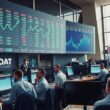Volkswagen Doubles Down on China Despite Rising Tensions
Despite escalating geopolitical anxieties and ongoing trade disputes, Volkswagen is significantly expanding its presence in China, prioritizing access to crucial semiconductor technology as a cornerstone of its future strategy.. In remarks to the Handelsblatt, Volkswagen’s China CEO, Ralf Brandstätter, emphasized the imperative of internal mastery of advanced chip development to power autonomous driving capabilities and smart cockpit features, arguing that simply procuring chips from external suppliers is no longer sufficient.
Brandstätter’s statement highlights a complex predicament for Western automakers increasingly reliant on the Chinese market. While acknowledging China’s position as the world’s largest and most innovative automotive hub, Volkswagen’s deepening investment also raises critical questions regarding data security, intellectual property protection and potential dependence on a market increasingly influenced by Beijing’s strategic priorities.
The company’s response involves a bifurcated engineering approach, developing distinct electric vehicle architectures tailored for China, Europe and the United States. This localized strategy, while intended for flexibility, underscores the extent to which Volkswagen is adapting to the unique demands and regulatory landscape of the Chinese market.
However, Brandstätter’s warning carries substantial political weight. He cautions that companies failing to cultivate indigenous technological competence within China risk losing their competitive edge globally, suggesting that success in China is rapidly becoming a prerequisite for broader international success in the automotive sector. This raises concerns about a potential “splintering” of the automotive industry, with significantly differing technological ecosystems developing independently across regions.
The company’s long-term commitment also introduces a layered risk profile. While essential for securing future technologies and catering to evolving consumer needs, prolonged dependence on the Chinese market renders Volkswagen vulnerable to shifts in political climate and regulatory changes that could ultimately compromise Western interests. The investment signals a calculated bet that the potential rewards outweigh the escalating geopolitical uncertainties, a strategy that will be closely scrutinized by policymakers in Europe and the United States.





